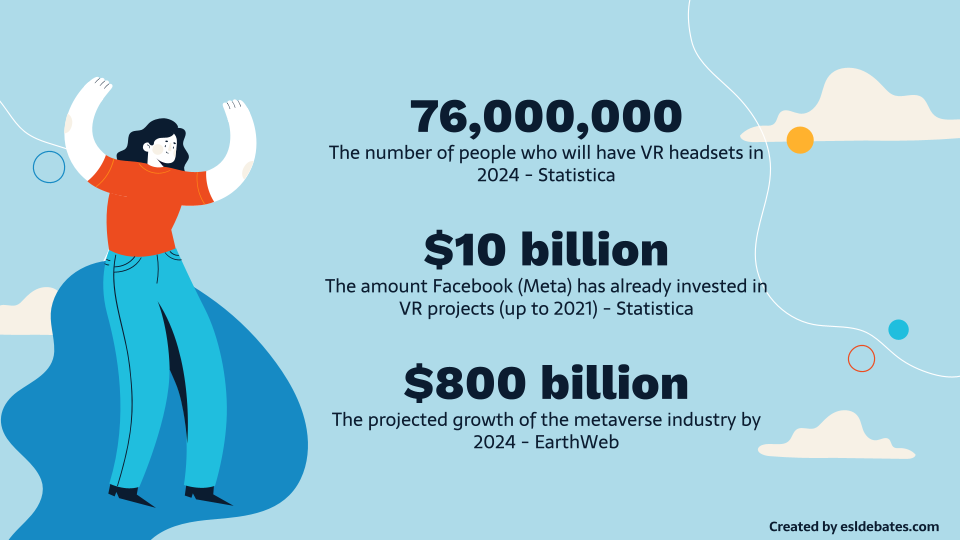The metaverse is a popular term in gaming. It is a virtual world where users can interact with each other in 3D, much like virtual reality. It allows people to interact with engaging activities in real-time while also offering unlimited customization in an open-ended environment (like a sandbox). Allowing people to be creative in a limitless space is potentially the next frontier for gaming, work, leisure, and the economy.
Facebook has seen the potential for this technology and has taken the step to rebrand to Meta in anticipation of this change in lifestyle. To enter the virtual reality “space”, users will need to use computer hardware that looks like special goggles that are placed over the head, ears, and eyes. As you move your head, your movements are replicated in the digital world.
It is believed that the Metaverse will be divided into open and closed ecosystems. All will live in the cloud, in some form or another, and will be accessible to users of all types of devices, whether they wear a headset or not. While some have attended virtual events in games such as Fortnite’s it is hoped that this is the beginning of larger, and more complex online worlds.
Why might the metaverse become important?
As improved IT platforms unleashed e-commerce, interactivity, and productivity to drive innovation, digital history has evolved from what our children would refer to as the Digital Stone Age (pre-internet) to the World Wide Web (access to content), followed by the internet of services, like Facebook and Google. The second phase came as a result of the rapid growth of smartphones, which gave rise to the hyper-connected society and the spread of social media like a virus.
Thanks to a plethora of linked devices with sensors and connectivity, technology is now not only in our pockets but all around us (the Internet of Things or IoT). The internet has evolved from humans conversing with humans to humans conversing (or at least attempting to converse) with machines, and hence machines conversing with machines. Human connections are being profoundly altered as a result of this change. When algorithms can accomplish specific tasks with unwavering precision, technology can not only augment but also replace our skills. We are about to enter a new phase with the arrival of the metaverse, in which virtual interactions will once again take center stage.

What are the challenges?
There are no recognised standards for interoperability across numerous metaverses because technological foundations are emerging.
Consumers want to be able to easily move and share virtual assets and experiences across several platforms, and developers expect to be able to freely choose the appropriate cross-platform tools. In order to operate inside an interoperable metaverse, it is expected that many large-scale platforms need to change their economic models in the future. Given the vast amount of potentially sensitive personal information involved, privacy and data security will be critical. Other problems include mental health, particularly if virtual worlds cause users to avoid real-world duties and interactions.
Teacher Resources
Level: Intermediate: B1/B2
Running Time: 90 minutes +
Key Terms
To understand this debate it is useful to learn the following words and concepts.
Collaboration
Meta & universe = metaverse
Augmented reality
Virtual reality
Compelling
Interoperability
Anticipation
Sandbox
Dystopian
Nightmare
Pros and Cons of The Metaverse (Virtual Reality)
We already spend far too much time using smartphones and computers
Agree
There is a national smartphone epidemic. People have been diagnosed with having an addiction to using smartphones that affects their health. They often suffer from problems sleeping, back pain, carpal tunnel in their wrists, and as a direct consequence, they have few friends and do not know how to socialise in real life.
Children and adults already use far too much technology in their lives. For adults, there is enormous pressure to be available all the time to answer emails. Children are now having to study using online learning materials in conjunction with the main source of socialising, which is online gaming. We are now going to have to spend even more time online and then the real world becomes a place to maintain our body so that we can go back online when we are ready.
The impact on human health is far too great.
Disagree
The main issue here is that far too many assume that more technology is better. We have phones, email, fax machines, text messages, instant messenger apps (WhatsApp), and more. We need to be smarter with the technology we are using so that we are not swamped with information and use multiple types of communication channels.
Also, if the metaverse is going to be part of working life, then it will replace many existing technologies like phone calls, video calls, and text messages. The difference is like that of horses and cars. One way of life is being replaced with something else that is better in ways that are not absolutely clear at the moment.
For children, they need to have more controlled use of technology so that they have time to develop real-life skills they need when they are older.
The metaverse is overhyped
Agree
The metaverse is just virtual reality by another name, it isn’t special at all. I can’t believe companies and investment firms are pouring money into something that is already quite old. I remember VR games like Second Life where people could buy a property and live a digital “second life”. It is crazy to think that this is being rebranded so that it can be encouraged on consumers again. If you don’t believe me, then here is what Elon Musk said:
“I’m not sure I buy into this idea of the Metaverse stuff. Sure you can put a TV on your nose. I’m not sure that makes you ‘in the metaverse,’ y’ know. I don’t see someone strapping a frigging screen to their face all day and not wanting to ever leave. That seems — no way, I think we’re far from disappearing into the Metaverse. It sounds kind of like a buzzword. I don’t want to be like some old codger dismissing the internet in like 1995 [saying] it won’t amount to anything, there’s some danger of that, but I currently am unable to see a compelling metaverse situation.”
– Elon Musk, 2021
Disagree
The metaverse, I believe, will be a wild, organic, and magnificent evolution of what we now call the internet and web.
Images and diagrams of the internet today resemble a biological construct, with neuron-like connections and the formation of proto-life. Although many may try, no single entity will be able to govern the metaverse (or should).
It will feature legacy components that look and feel like the web today, as well as new nodes and capabilities that look and feel like the Ready Player One Oasis (wonderful gaming worlds), immersion leaking into our world, and any combination of these. Gradients of consciousness and autonomy.
My children have already accepted the potential to have a second existence in a virtual environment. They can not only dress their avatar in Air Jordans that they can’t get in the real world, but they can also exchange ideas, creativity, emotional intelligence, and, ultimately, dreams with billions of people instead of being limited by socioeconomic, border, and language limitations.
Keeping virtual worlds safe is a huge challenge
Agree
Digital identity will be one of the most important aspects of the Metaverse to safeguard. It will be far more than your current Google or Facebook account, as previously stated. This will be your complete digital life, including your money and sensitive data, as well as your distinct online (and offline) identity. Protecting it from theft will be vital to Metaverse’s overall success. Likewise, ensuring that Metaverse users cannot impersonate others will be a priority.
As a result, businesses will be required to act as both enablers, participants, and celebrants in the Metaverse, as well as authenticators. They’ll have to figure out a way to keep cheating and fraud out of the Metaverse so that its users are satisfied. Making an experience secure, balancing privacy, and keeping it pleasant for everyone all have genuine trade-offs. Sure, blockchain and NFT will be utilised as assurances of authenticity in the Metaverse, but there will still be a need for more traditional security methods, such as protecting against hacking or tampering if all other security measures fail.
Disagree
Yes, it is quite right that there are still unknowns for how we can keep people safe on metaverse-like platforms. What is clear from the rising use of social media platforms, which are quite similar, is that companies are able to adapt to new changes and threats as they come. For example, when Facebook realised that their platform was being used by criminals, they took steps to ensure they can be tracked and actions are reported to the police.
Over time, firms have shown that they can be relied upon to self-manage and self-regulate their content and ensure users are safe.
Further reading
Images of people used under license from Generated Photos







